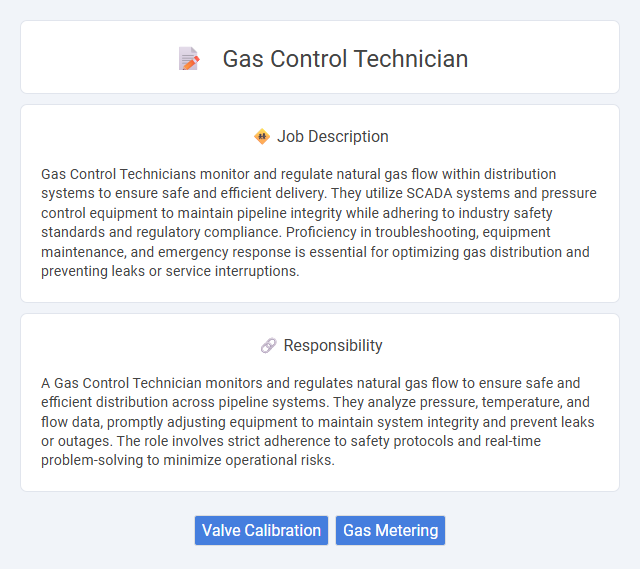
Gas Control Technicians monitor and regulate natural gas flow within distribution systems to ensure safe and efficient delivery. They utilize SCADA systems and pressure control equipment to maintain pipeline integrity while adhering to industry safety standards and regulatory compliance. Proficiency in troubleshooting, equipment maintenance, and emergency response is essential for optimizing gas distribution and preventing leaks or service interruptions.
Gas Control Technician roles likely require individuals with strong problem-solving skills and the ability to work under pressure, as the job involves monitoring and managing gas distribution systems that impact public safety. People who are detail-oriented, safety-conscious, and comfortable working with technical equipment may be more suited for this position. Those who struggle with high-stress environments or lack mechanical aptitude might find the job challenging or less suitable.
Qualification
A Gas Control Technician must possess a strong background in mechanical or electrical engineering, often requiring an associate degree or relevant certification in gas systems. Proficiency in interpreting technical diagrams, operating SCADA systems, and adhering to safety regulations is essential. Experience in troubleshooting gas control equipment and maintaining pressure regulation systems enhances job performance and reliability.
Responsibility
A Gas Control Technician monitors and regulates natural gas flow to ensure safe and efficient distribution across pipeline systems. They analyze pressure, temperature, and flow data, promptly adjusting equipment to maintain system integrity and prevent leaks or outages. The role involves strict adherence to safety protocols and real-time problem-solving to minimize operational risks.
Benefit
Gas Control Technician jobs likely offer competitive salaries and comprehensive benefits packages, including health insurance and retirement plans. Opportunities for professional development and certification may enhance career growth and job security. The role's demand in energy sectors suggests a stable employment outlook with potential for overtime pay.
Challenge
The role of a Gas Control Technician likely involves managing complex systems to ensure the safe and efficient distribution of natural gas, which may present constant technical and operational challenges. Handling unexpected pressure fluctuations or equipment malfunctions could require quick problem-solving skills and a thorough understanding of industry regulations. The probability of encountering high-stakes situations suggests that adaptability and precise decision-making are crucial to maintaining system integrity and safety.
Career Advancement
A Gas Control Technician develops expertise in managing pipeline systems and controlling gas flow to ensure safety and efficiency. Career advancement often leads to roles such as Senior Technician, Operations Supervisor, or Pipeline Manager, with increased responsibility for system design and regulatory compliance. Continuous certification and specialized training in gas control technologies significantly enhance promotion opportunities in this field.
Key Terms
Valve Calibration
Gas Control Technicians specialize in valve calibration to ensure precise regulation of gas flow and pressure within industrial systems. Accurate calibration of valves is critical for maintaining safety standards, optimizing system performance, and preventing operational failures. Their expertise involves using advanced diagnostic tools and adhering to strict industry protocols for routine inspections and adjustments.
Gas Metering
Gas Control Technicians specializing in gas metering ensure accurate measurement and monitoring of natural gas flow through pipelines, utilizing advanced metering devices such as ultrasonic and diaphragm meters. They perform routine calibrations, maintenance, and troubleshooting to maintain compliance with industry standards and safety regulations governed by agencies like the American Gas Association (AGA). Proficient in data analysis and SCADA systems, these technicians optimize gas distribution efficiency and prevent measurement discrepancies that could impact billing and operational reliability.
 kuljobs.com
kuljobs.com